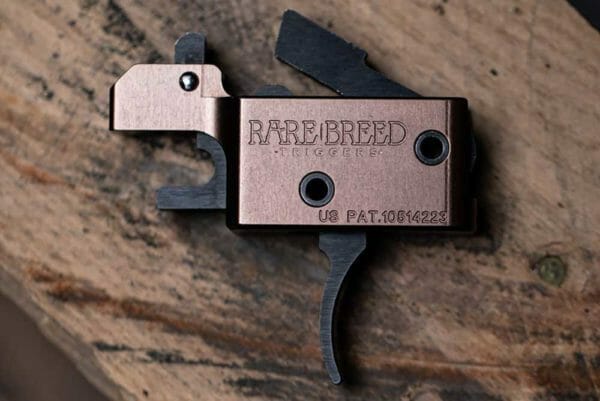
WASHINGTON, D.C. -(Ammoland.com)- Rare Breed Triggers was formed to sell forced reset triggers to the general public. Although many in the gun community would consider these triggers to be semi-automatic, the Bureau of Alcohol, Tobacco, Firearms and Explosives (ATF) has long considered them to be machine guns. This difference of opinion has led to a long, drawn-out battle that has seen the ATF going door-to-door of American gun owners’ homes. To understand how we got to this point, we have to look at the history of the company at the center of it all.
In 2017, Wolf Tactical LLC submitted the AR1 trigger to the ATF for a classification letter. This trigger was the first actual forced reset trigger, although it was similar to the Tac Con 3MR, a positive reset trigger with an approval letter from ATF, and it worked slightly differently. One year later, on August 28, 2018, the ATF sent a letter to Wolf Tactical LLC informing them that the ATF determined the AR1 was a machine gun. Rare Breed Trigger would later purchase the patent from Wolf Tactical LLC, and as a result, the ATF claims that the AR1 was the precursor to the Rare Breed Triggers FRT-15.
Under the National Firearms Act (NFA), anything that converts a semi-automatic firearm into an automatic firearm is considered to be a machine gun itself. This designation applies to items such as lightning links and drop-in auto sears (DIAS). The ATF once even ruled that a shoelace was a machine gun. This rule logic is also how the ATF justified banning bump stocks.
In 2019, the owner of Rare Breed Triggers acquired a patent from Wolf Tactical LLC. This was the same patent Wolf Tactical LLC held for the AR1. In April of the following year, Rare Breed Triggers would be formed. By December, the company launched the FRT-15 for sale to the general public. Unlike the AR1, Rare Breed Triggers never submitted the FRT-15 to the ATF for testing while at the same time advising its customers that it was legal to own.
Additional refinements were made to the forced reset trigger, and Company A [Wolf Tactical LLC] obtained a patent for the design, U.S. Patent #10,514,223 (the ’223 patent). The ’223 patent provided a solution for its forced reset trigger concept. The ’223 patent was otherwise designed to function no differently from the AR1, which ATF had classified as a machinegun. The ’223 patent represents a modular forced reset trigger assembly (i.e., the AR1 already assembled with slightly different parts), ready to drop into an AR15-style firearm. The “drop-in” nature of the design allowed for its easy and rapid installation into an AR-type firearm by a person with limited skills utilizing common hard tools. Further, while the AR1 was designed to function with a modified bolt, the ’223 was designed to function with an off-the-shelf bolt carrier designed for fully automatic M16-type firearms
The ATF claims that the company knew it would not get a determination letter from the ATF stating that the trigger was a semi-automatic trigger, so it chose to hire outside experts to examine the trigger and assured customers that the triggers were legal. Rare Breed Triggers pointed out that accessories do not require ATF approval to sell.
Most recent court documents filed by the Justice Department in the United States District Court Eastern District of New York show that the money that came into the company flowed through many different businesses owned by Rare Breed owner Kevin Maxwell and Rare Breed President Lawrence DeMonico. While there could be many reasons for setting up multiple interlocking companies, the ATF claims that the structure was to obscure the ownership of Rare Breed Triggers. However, Mr. DeMonico would become the public face of Rare Breed Triggers once the ATF started targeting the company and named the owners.
It would not take long after the FRT-15 trigger hit the market before the ATF took notice. A month after the launch, an ATF Intelligence Research Specialist (IRS) named Robert Lopez found a video of the trigger from Recoil TV while browsing the infamous website 4Chan. On January 13, 2021, IRS Lopez reached out to ATF Firearms Enforcement Officers (FEO) James Barlow and Daniel Hoffman to ask if the Firearms and Ammunitions Technology Division (FATD) examined the trigger because he was concerned it was a machine gun. The two FEOs confirmed that FATD had not issued any classification letters for the Rare Breed FRT-15 trigger. This exchange would not end Mr. Lopez’s crusade against the trigger.
On April 1, 2021, Lopez would reach out to Special Agent Michael Nuttal from the ATF’s Tampa Field Office about his concerns about the FRT-15. Rare Breed Triggers offices were located in Central Florida and fell within the territory of the ATF’s Tampa Field office. On the same day, he would once again reach out to SA Hoffman, saying that “several concerned citizens” contacted him about the FRT-15.
Although multiple Freedom of Information Act (FOIA) requests have been filed over forced reset triggers, no evidence of any contact between Lopez and concerned citizens could be found. IRS Lopez never explained how these alleged citizens contacted him, but the FOIA requests should have turned up this information if it was through email.
On the same day, SA Hoffman wrote IRS Lopez back, stating that he believed the FRT-15 was a machine gun due to the similarities between the FRT-15 patent and the patent for the AR1 trigger, which was determined to be a machine gun by the ATF in 2018. Although he admitted, he never examined the FRT-15 trigger. He would point Lopez to SA David Smith. On April 8th, 2021, Smith would double down on Hoffman’s claim. He said they believed the trigger was a machine gun but needed a trigger to test before issuing a final opinion. At the time, the triggers were sold out on the Rare Breed Triggers website, and Lopez was on the waiting list with no shipping date in sight.
Smith’s email reads: “Is there anything you want us to include in the report? I will most likely use a lot of the language from the examination back in 2018. I will also include that based on your review from the blueprints, pictures, and video, FATD believes it appears to be a machine gun, BUT FATD will physically need to examine the trigger to make an official determination.”
On May 24, 2021, SA Smith wrote IRS Lopez suggesting if he still was having trouble buying the triggers through the Rare Breed website, he should buy them on the secondary market. Smith sent Lopez a listing from Gun Broker. Lopez purchased a trigger from Gun Broker, and the triggers became available on the Rare Breed website at the same time. For some reason, Lopez could not complete the sale through the Rare Breed Triggers’ website, so Lopez purchased a second FRT-15 trigger from a GunBroker seller. SA Smith seems to have fully bought into investigating the FRT-15 during this period.
Having received both triggers, Lopez shipped the FRT-15s through FedEx on June 2, 2021, to Smith at FATD in Martinsburg, WV. Two days later, Smith would receive the FRT-15s and begin testing the triggers. Smith completed his testing on July 15, 2021. He used zip ties to engage and hold the trigger back. He claimed the firearm continued to fire multiple rounds with a single function of the trigger. Because of the tests, FATD designated the triggers as machine guns and subject to NFA regulations.
This determination set into motion a battle that is continuing today.
On July 26, 2021, SA Nuttal of the Tampa Field Office would serve Rare Breed Triggers with a Cease-and-Desist order. A day later, the ATF would meet with Rare Breed Triggers’ owner and lawyer, Kevin Maxwell, and tell him that the company was no longer allowed to sell the FRT-15. Rare Breed Triggers would continue to market and sell the triggers despite the ATF’s cease-and-desist letter. It was business as usual for the company. A couple of weeks later, Rare Breed’s woes would continue. The company would break up with its sales partner, Big Daddy Unlimited (BDU), when Big Daddy Enterprises, the parent company of BDU, started a new company, Wide Open Enterprises and begun marketing the Wide Open Trigger (WOT). The WOT was a force reset trigger that Rare Breed claimed infringed on its patents for the FRT-15.
On August 2, 2021. Kevin Maxwell filed a lawsuit against the ATF in the Middle District of Florida. AmmoLand News would break the news of the ATF’s action and the suit on August 13, 2021. Until this point, customers were left in the dark about the ATF’s action against the trigger. On August 19, Mr. DeMonico posted a video to Vimeo stating that the company had no intention of complying with the cease-and-desist order and laid out his case as to why the company chose to disobey the cease-and-desist order.
“To put it simply, our trigger is not a machine gun as the ATF alleges, and we have complied fully with the law throughout the manufacture and production of this product,” DeMonico said. “What’s dangerous is that the ATF is no longer just enforcing the law but starting under the Trump administration and continuing through the Biden administration, the ATF and other agencies which are supposed to enforce the law, now believe that they can reinterpret and change the law, whenever it suits their desires.”
Rare Breed Triggers vs ATF – Public Statement – 2021/08/19 from Rare Breed Firearms on Vimeo.
Later in the month, on August 31, Rare Breed Triggers would serve their own cease-and-desist letter. This time the cease-and-desist letter was to Big Daddy Unlimited (BDU) for patent infringement. This letter wouldn’t be the last cease-and-desist letter Rare Breed would issue. The company would later also serve Graves Triggers and 3D printing whiz kid Hoffman Tactical with cease-and-desist letters.
While Rare Breed Triggers was battling Big Daddy Unlimited (BDU) over their patents, the battle with the ATF was continuing.
On October 12, 2021, Rare Breed was dealt a blow in court when the judge rejected their request for an injunction against the ATF’s actions. The ATF would reach out to Rare Breed Triggers a month later on November 15. The ATF was adamant that Rare Breed Triggers stop selling the FRT-15. The company would again refuse the ATF’s demands and continue selling the triggers.
Rare Breed Triggers would get some good news right after Christmas. A judge issued a preliminary injunction against BDU and its adjoining companies, preventing them from selling the WOT. But everything was going to change less than a month later when on January 13, 2022, the ATF sent out a “law enforcement sensitive” bulletin to police departments across the country. AmmoLand News obtained a leaked copy of the bulletin that claimed that some forced reset triggers were machine guns. The document contained pictures of the FRT-15 and the WOT. The ATF was about to start taking additional actions against companies selling the triggers.
Eight days later, on January 21, the ATF would show up at the door of BDU and two other companies owned by Big Daddy Enterprises, where the Bureau would seize all WOTs and FRT-15 triggers. At the time AmmoLand News incorrectly reported that the ATF went to Rare Breed Triggers. A statement Rare Breed would deny and push back against heavily. It wouldn’t be until earlier this year that, through court documents, we could determine they did not go to Rare Breed Triggers,
BUT the ATF did go to 3rd Gen Machine, the contract manufacturer of Rare Bred Triggers, something Rare Breed Triggers never mentioned in its rebuttal calling out AmmoLand News.
Rare Breed Triggers did not produce the triggers. 3rd Gen Machine was the contract manufacture.
The ATF showed up to 3rd Gen Machine and served the company with a cease-and-desist order. Much like Rare Breed Triggers, 3rd Gen Machine ignored the ATF’s demand. In March of 2022, the ATF would apply for and receive a search warrant for 3rd Gen Machine in Arizona. The ATF would execute that search warrant.
During the same month, the ATF would start to prepare to target individual buyers of the FRT-15 triggers. On March 22, the ATF issued a letter to Federal Firearms Licensees (FFL) warning them that “some” FRT triggers were machine guns. We can infer from prior letters and actions that the ATF was targeting the FRT-15 and the WOT, but these inferences were about to be confirmed. AmmoLand News was tipped off that the ATF was visiting FFLs over the sale of the triggers. Agents were seeking records of customers that purchased WOTs and FRT-15s. The hammer was about to drop.
While the ATF was visiting FFLs, they arranged to pick up the FRT-15s and parts that 3rd Gen Machine had at its facilities, but according to court documents, Mr. DeMonico showed up at 3rd Gen Machine first on April 14, 2022, to get his “shit.” The general manager says he told Mr. DeMonico that the ATF was coming to get the triggers. DeMonico allegedly told the 3rd Gen Machine General Manager he “didn’t care,” loaded up a U-Haul Van with FRT-15s and parts to make FRT-15s. He would drive off ahead of the ATF’s visit.
Mr. DeMonico would make it as far as New Mexico, where on April 15, local authorities and the ATF stopped him while driving the U-Haul van. Law enforcement authorities recovered almost 1,000 FRT-15s and over 15,000 parts and components from the van.
Law enforcement did not charge DeMonico with a crime. Which begs the question, why didn’t they arrest a person caught with nearly 1,000 unregistered “machine guns?”
Rare Breed Triggers would reform as a North Dakota company and, on May 16, 2022, would again file for a preliminary injunction against the ATF in a much friendlier court to gun issues. The ATF would object, stating that Rare Breed did not actually operate from North Dakota. The ATF would send a paralegal to the company’s registered address only to find it was a Regent Office. A Regent Office offers virtual office space, someone to answer the phone as Rare Breed Triggers and forward mail. The ATF claimed that Rare Breed lacked standing to sue in North Dakota.
In August of 2021, the ATF would act against buyers of the FRT-15 who purchased the triggers in good faith. On August 5, the first known arrest over force reset triggers happened in Holyoke, Massachusetts. A man was arrested for having multiple unregistered machine guns. Four of these “machine guns” were forced reset triggers. Three of the recovered triggers deemed “machine guns” were Rare Breed FRT-15s, and one was a Tommy Triggers FRT-15-3MD. Then on August 21, the ATF started going door-to-door of buyers confiscating FRT-15s. The ATF visits began in Greenville, SC, but soon would touch every state. Most of these buyers purchased their triggers from a GunBroker seller. Most all trigger sales are traced back to one seller from Austin moving a volume of forced reset triggers and solvent traps.
Rare Breed Triggers would continue to fight the ATF in court, but the company was about to be hit with a devastating blow. November 4, 2022, the judge in the North Dakota case would side with the ATF’s argument and dismiss the case for improper venue. Rare Breed Triggers vowed to fight on and refile their lawsuit. At the time of this article publishing the lawsuit has yet to be refiled.
Rare Breed Triggers would continue to sell forced reset triggers even though the noose seemed to be tightening. This time the company would somehow acquire thousands of WOTs, the same type of trigger the ATF confiscated from BDU. An email sent by Rare Breed on November 22, 2022, offered the triggers at a heavily discounted price of $199. According to the ATF, Rare Breed shipped out 3,460 shipments between November 28 and December 5. The packages were marked and shipped from “Red Beard Treasures.” The ATF claims this was to hide the contents of the packages.
Since the ATF knows how many packages were sent and where they were shipped from, we can almost be positive they know where and who received the packages from Red Beard Treasures.
On January 19, 2023, the ATF would file for a temporary restraining order (TRO) against Rare Breed Triggers in an ex-parte hearing in a Federal District Court in Brooklyn, New York. An ex-parte hearing means that the court only hears one side, and the other side doesn’t even know a hearing is happening. The ATF used its rocky relationship with Rare Breed Triggers and the company’s past actions to justify the ex-parte hearing.
The suit claims that Rare Breed Triggers, Rare Breed Firearms, Kevin Maxwell, and Lawrence DeMonico committed fraud, and the ATF is seeking a permanent injunction that would effectively end the sale of the FRT-15. The government claims that the Defendants conspired to defraud the United States, committed mail fraud, wire fraud, and sold machine guns. The court is asking the Defendants to be enjoined from continuing to commit those actions, maintain all customer records, permit expedited discovery (which would give the government access to all customer records), and help the government recover all FRT-15s and WOT sold.
The government also wants Rare Breed Triggers to pay restitution to anyone who purchased its triggers.
When people started worrying about the ATF showing up and wanted to return the triggers, the company refused to issue refunds. Now the government is looking to force Rare Breed Trigger’s hand. An independent third party will be required to oversee all activities related to the court order to be paid for by the Defendants if they are to lose the case. The cost of losing will be in the millions.
Rare Breed Trigger’s claim that this is government overreach, and effectively the ATF using a rule change as legislation has merit, as seen in the recent 5th Circuit Court case on the bump stock ban.
The Rare Breed Triggers FRT-15 is a force reset trigger. When a trigger is pulled, the FRT-15 trigger’s sear forces the trigger to reset. The trigger dramatically speeds up the rate of fire of an AR15 style of firearm. A machinegun is a gun that fires more than one bullet with a single function of the trigger. The shooter has to pull the trigger for every round that is fired, the company correctly believes that the FRT-15 trigger is not a machine gun. But much like the bump stocks, the ATF disagreed with the company’s assertion.
From Rare Breed Triggers lawsuit:
23. In other words, ATF may promulgate and enforce rules under this section of the United States Code, but ATF has no authority to change the Code or the Code’s definition of what constitutes a “machinegun”.
Rare Breed Triggers have vowed to keep fighting. The company is claiming that the Brooklyn Court is the wrong jurisdiction. They have until February 16, 2023, to file their motion to dismiss for lack of personal jurisdiction. The Plaintiffs will then have until February 23 to respond. The Defendants will then have until March 2 to file their reply. The Defendants have also agreed to limited discovery pertaining to the jurisdiction only. The scope of the limited discovery has not yet been determined. If the discovery cannot be agreed upon, then Plaintiff can file for a motion to compel discovery. The TRO has been extended to April 30, 2023. If the Court concludes that it has personal jurisdiction over the Defendants, a preliminary injunction hearing will occur on April 26 at 10:30 a.m. EST.
If Rare Breed Triggers lose the jurisdiction battle, they face an uphill battle. The Brooklyn Federal District Court is the most anti-gun District Court in the nation in one of the most anti-gun Federal Circuit courts.
AmmoLand News texted Lawrence DeMonico for comment, but we did not receive a statement by the time of this publishing.
The ATF suggests anyone with a Rare Breed Trigger FRT-15 contact them to arrange forfeiture. AmmoLand News recommends seeking legal counsel if gun owners have further questions.
About John Crump
John is a NRA instructor and a constitutional activist. John has written about firearms, interviewed people of all walks of life, and on the Constitution. John lives in Northern Virginia with his wife and sons and can be followed on Twitter at @crumpyss, or at www.crumpy.com.


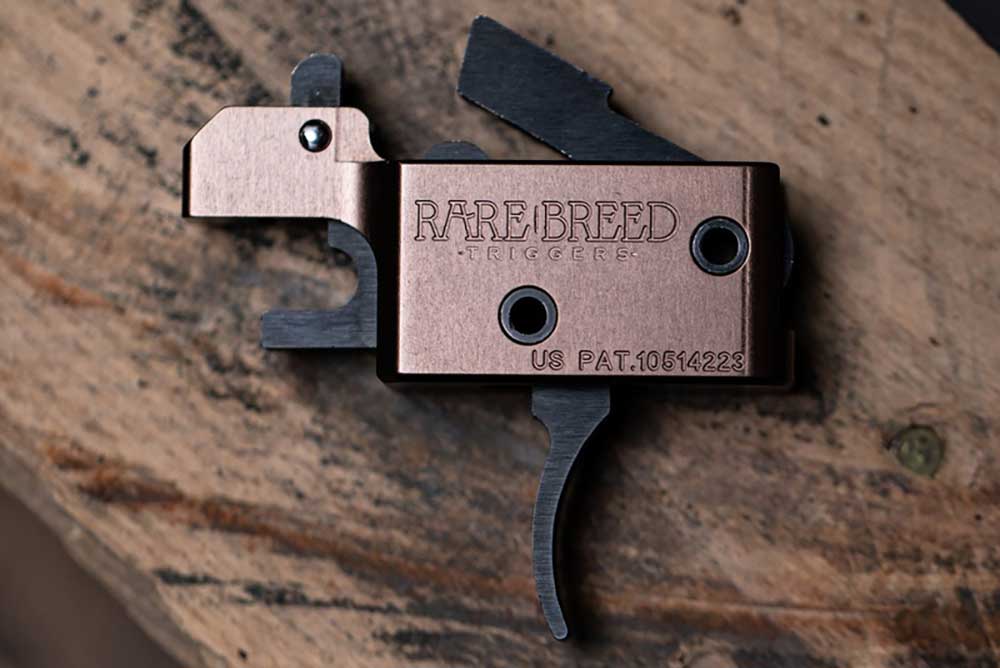

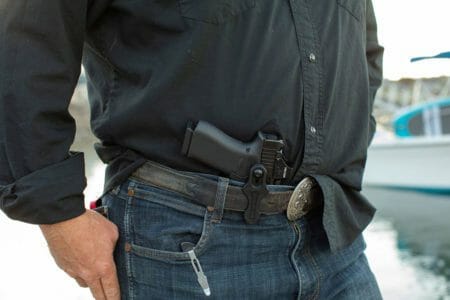
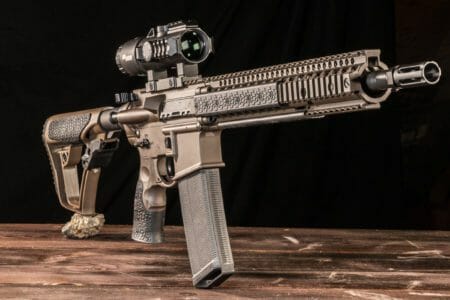
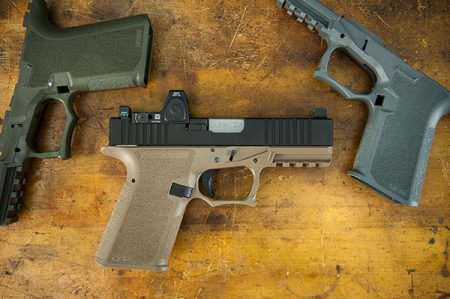

If the Republican Party ever regains the Presidency and both houses of Congress, they better flush some federal agencies and their BS down the toilette, by God.
Anyone who has handled zip-ties is familiar with what one might call their stiff flexibility, i.e. springiness. Using a zip-tie to hold the trigger is identical to adding a spring to the mechanism and vastly altering its operation.
How did we come to the current situation where an agency of the government, instead of Congress, is making laws without a legal challenge? The same applies to the EPA and others.
It’s pretty obvious to me that, like the infamous shoestrings, zip ties are machine guns.
Mr. Crump, yet another very informative and literary masterpiece., Thank you! It appears that the ATF is scrambling to muster purpose for its existence while knowing good and well that Florida Representative Matt Gaetz’s Bill and other such Bills that are in the process in this very same direction, to dissolve the ATF all together for its blatant disregard for The Constitution, The Bill of Rights and WE, The People as an end means to their existence. Just the long list of innocent lives lost at the hands of the ATF’s history, the shabby raids and screwed-up tactics not to… Read more »
I’ve seen the videos, as have many. Even a child can correctly determine the FRT is a semi-auto trigger, NOT a machine gun, and it requires a separate operation of the trigger for every round fired. The FBATFE is once again operating outside legal authority and making up laws as they go.